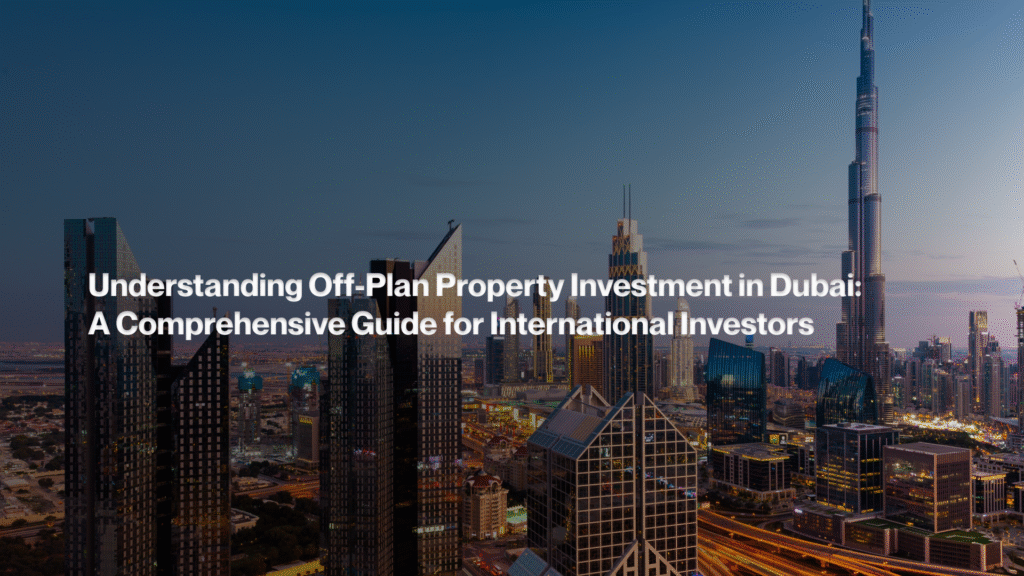Dubai, a city synonymous with architectural marvels and a thriving economy, has cemented itself as a top global destination for real estate investment. With its zero income tax, strategic location, and world-class infrastructure, it’s no surprise that international investors are drawn to Dubai’s real estate sector—especially off-plan properties.
Off-plan property investment refers to buying property before its construction is completed, often during the pre-launch or construction phase. Dubai offers a wide range of off-plan opportunities from some of the most reputed developers like Emaar, DAMAC, Nakheel, and Sobha.
Benefits of Off-Plan Property Investment in Dubai

1. Lower Entry Prices
One of the biggest draws of off-plan property is the competitive pricing. Since the units are not completed, developers often offer discounted prices, making it more affordable than ready-to-move-in properties.
2. High Capital Appreciation Potential
As the project nears completion, the value of the property typically rises. This makes it a strong avenue for capital gains if purchased at an early stage and sold closer to delivery.
3. Flexible Payment Plans
Developers offer extended, interest-free payment plans, sometimes even post-handover, making it easier for international investors to enter the market without immediate full capital.
4. Wide Range of Choices
From beachfront apartments to high-rise penthouses and golf course villas, investors can choose from a variety of project types and locations that suit their financial goals.
Key Locations to Invest in Off-Plan Properties
Dubai Marina
Known for its waterfront views and luxury towers, this area attracts both tourists and residents, ensuring strong rental yields.
Downtown Dubai
The home of Burj Khalifa and Dubai Mall, this area remains one of the most prestigious. Off-plan developments here are highly sought-after due to the central location.
Dubai Creek Harbour
An emerging hot spot with eco-friendly master planning, scenic waterfronts, and the upcoming Dubai Creek Tower.
Dubai South
Close to Al Maktoum International Airport and Expo City, this area is growing fast and offers affordable yet promising investment options.
Risks and How to Mitigate Them
1. Project Delays
Although developers in Dubai are regulated by the Dubai Land Department (DLD) and Real Estate Regulatory Agency (RERA), delays can still occur. Invest only in RERA-approved projects and choose developers with a strong track record.
2. Market Fluctuations
The real estate market can fluctuate based on global economic conditions. It’s wise to adopt a long-term investment strategy to weather short-term dips.
3. Developer Reliability
Not all developers deliver on promises. Always conduct due diligence by reviewing past projects, checking reviews, and confirming RERA project registration.
How to Buy Off-Plan Property in Dubai: Step-by-Step Process
Step 1: Define Your Investment Goals
Identify whether you’re looking for rental income, capital appreciation, or a second home. Your goal will influence location, type, and budget.
Step 2: Choose a Trusted Developer and Project
Research developers through the Dubai Land Department’s official website and only consider projects with DLD escrow protection and clear payment terms.
Step 3: Reserve the Property
Pay the booking fee, which is usually around 5-10% of the property price. This secures your unit in the development.
Step 4: Sign the Sales and Purchase Agreement (SPA)
This legal contract outlines the project details, delivery timeline, and payment structure. Make sure it includes penalty clauses for delays.
Step 5: Register with DLD and Pay Fees
Your off-plan property must be registered with the Dubai Land Department. Expect to pay approximately 4% DLD registration fee, plus admin charges.
Step 6: Follow the Payment Plan
Developers typically offer milestone-based payments (e.g., 10% on booking, 10% after 6 months, etc.). Make sure to track your obligations.
Step 7: Take Handover and Manage the Property
After construction, inspect the unit before accepting handover. Post-handover, you can either rent it out, resell, or live in it.
Legal Framework and Investor Protections in Dubai
Dubai has implemented strong legal frameworks to protect investors:
- Escrow Accounts: Developers must deposit all payments into escrow accounts managed by DLD-approved banks, ensuring money is used only for construction.
- RERA Oversight: All off-plan projects are monitored by RERA to ensure transparency, compliance, and accountability.
- Project Cancellation and Refunds: If a project is cancelled, investors are entitled to a refund as per DLD regulations.
Post-Handover Strategy for Investors
Once your property is handed over, you have multiple options:
1. Rental Income
Dubai offers high rental yields, particularly in sought-after areas. Consider hiring a property management company to handle tenant relations and maintenance.
2. Resale
If the market value has appreciated, reselling can be highly profitable. Note that off-plan resale may require developer approval and nomination transfer fees.
3. Long-Term Hold
Holding your property for several years can yield both stable rental income and long-term appreciation, especially with Expo City and tourism growth.
Taxation and Ownership for Foreign Investors
1. Zero Property Tax
Dubai does not impose property tax, capital gains tax, or rental income tax for individual investors, making it highly lucrative.
2. Full Ownership in Designated Zones
Foreign investors can own freehold property in designated zones like Dubai Marina, Downtown, JVC, and Business Bay.
3. Inheritance and Visa Benefits
Property investment of AED 750,000 or more can qualify you for a renewable residence visa. Dubai also allows property inheritance under local or Sharia laws, depending on your will.
Tips for International Buyers
- Use a Registered Real Estate Broker: Avoid scams and ensure compliance by working only with RERA-certified brokers.
- Understand the Currency Impact: Fluctuations in exchange rates can affect your investment value, especially if you’re buying in non-dirham currencies.
- Stay Updated on New Launches: Developers frequently release limited-time offers, fee waivers, and new inventory. Join mailing lists of reputable brokerages for early access.
Conclusion: Is Off-Plan Investment in Dubai Worth It?
For international investors looking for high returns, flexible terms, and a legally safe environment, Dubai’s off-plan market presents a compelling opportunity. By conducting due diligence, choosing reputed developers, and aligning your investment with your financial goals, off-plan property in Dubai can become a cornerstone of a robust real estate portfolio.
